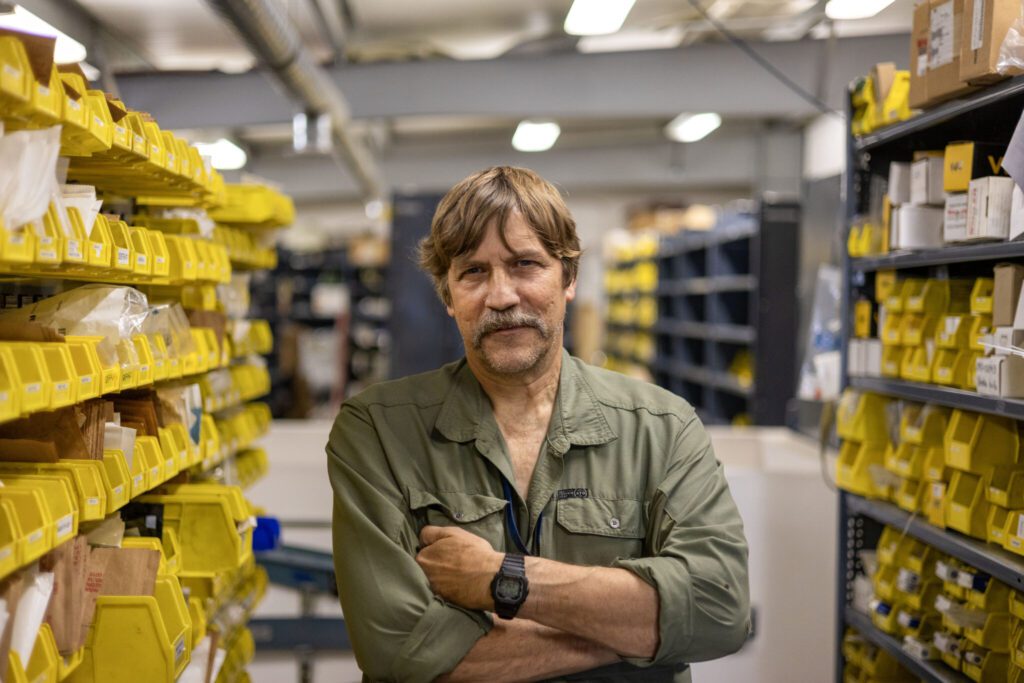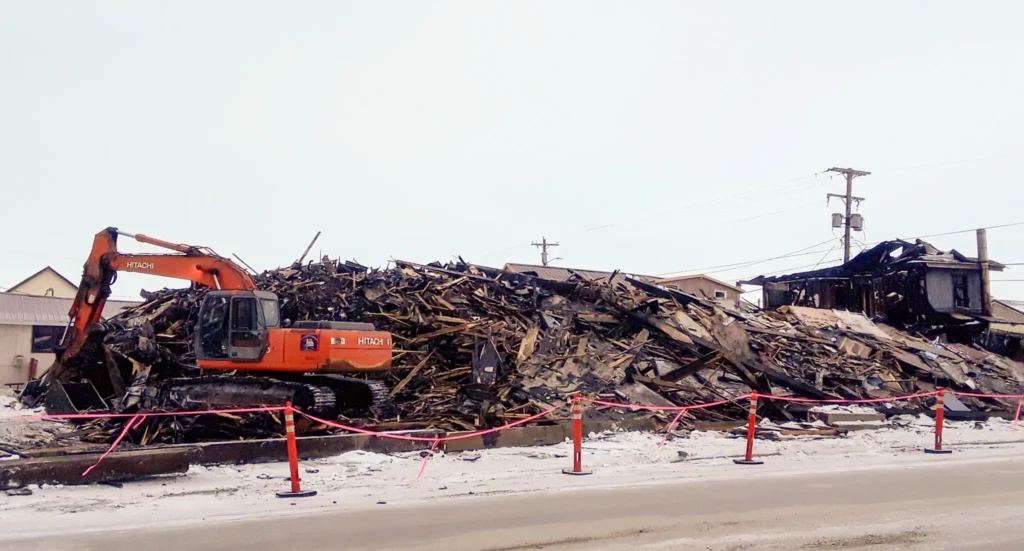For many households, fall is a time of celebration. Cooler weather brings an end to summer subsistence but marks a beginning of the winter holiday season. And for qualifying Alaska residents, there’s the arrival of Permanent Fund Dividend checks.
The annual PFD payout is, for many, a holiday unto itself. An opportunity to pay bills, buy groceries, splurge on clothes and electronics–maybe even take a vacation. For hub communities like Nome, the arrival of PFD checks also means business.
“For the cab business, it’s going to mean a lot more basic traffic,” said Seiji Heck, a driver for Checker Cab Company in Nome. For Heck, an increase in traffic to and from Nome translates to an increase in demand for cabs.
“We’re going to have a lot more people coming in from the villages,” he said. “So a lot more are running back and forth between the airport. And that’s going to also increase the amount of time these people are going to be going to and from the stores like Hanson’s or AC. We’re going to be picking them up a lot.”
Mark Melton is the branch manager of AC in Unalakleet, and previously worked at the store branch in Nome. He said PFD season definitely brings a boost in sales for stores like AC–which can quickly sell out of certain items.
“It’s mostly big ticket items,” said Melton. “Appliances, furniture, bedding. Definitely the time of year we get the opportunity to move bigger ticket items. T.V.’s and stuff like that.”
Melton says that while sales trend toward larger items during dividend time, many people take advantage of seasonal flight deals to do their shopping in the big cities, using hub communities like Nome as a stop along the way.
Tina Yi owns the Polaris hotel, bar and liquor store in Nome. She says the arrival of PFD checks mean little change to her business for that very reason.
“PFD doesn’t affect local business as much as you think it will, because people travel to Anchorage and a lot of bigger cities. They come through town and they leave right away,” said Yi.
Certain businesses see more traffic than others. Yi notes that her hotel business does better than the bar and restaurant around PFD time, as people travel through Nome on their way to and from Anchorage. Airlines like Bering Air and Ravn also pick up business, with flights to and from rural communities.
As for the cab business, Heck’s car is often filled to capacity.
“We’ll have people who will take off from Nome to go to Anchorage and then bring back a lot of stuff to take home,” he said. “I have a cab with an extra row of seats in the back cargo and then on top of the seats as well. The back seat’s filled up and then everyone’s crunched in the front.”
Heck said another peak time for cab drivers arrives on weekends with the bar crowd. Along Front Street, some bars even extend their hours to take advantage of the festive atmosphere. But it’s not just visitors spending their cash on a good time. Heck said in personal time, a portion of his PFD gets spent that way, too.
“It’s good for businesses downtown,” he said. “And I’m not going to lie. I’ve partaken with my friends, as well. Since I have a few extra hundred bucks I’ve gone downtown. Let’s have some fun, you know. I believe, you know, why not. But you’ve got to cut yourself off, I think.”
An increase in bar traffic also means an increase in hours for the Nome volunteer ambulance department, of which Heck is also a member. Vicki Erickson, the department chief, said emergency calls swell with the arrival of dividend checks.
“We’re going to have a lot of people in town,” she said. “They’re going to bring their checks with them. Maybe their children’s checks as well. They’ll buy extra groceries. They’ll buy winter clothing. They’ll do some very wise things with their money. Then there will be that population where maybe won’t spend their money as wisely as others. And maybe they’ll be found downtown, highly intoxicated and unable to care for themselves.”
Erickson said it’s not uncommon for Nome residents and visitors to start out spending their money on clothing or gifts, only to become caught up in the festive atmosphere of dividend season. She said the problems arise when bar-goers drink so much as to become unaware of their surroundings.
“You know, when you’re so intoxicated that you can’t walk, you sometimes fall. Or you sometimes become the victim of violence, if it’s out on the street or in someone’s home. And then that means you will see me and another member of the ambulance department coming to help you,” said Erickson.
Nome’s volunteer ambulance department is exactly that: A volunteer department. According to Erickson, that can present a staffing problem during PFD season, when calls may come in several times a night.
“It’s a really burnout factor when you’re called out night after night after night. And you have to get up and you have to go to work,” she said, adding that intoxication is “never fun to deal with.”
Over the years, Erickson has dealt with incidents ranging from theft and violence against patients too intoxicated to protect themselves–to alcohol poisoning and, in some cases, death. She said those situations exact more than just a physical toll.
“It’s hard on you emotionally, too,” Erickson said. “You go home and it’s very hard to sleep after you witness something like that. Or, you know, you witness the response of the family members who may have been there trying to revive that person. It’s a very hard thing, mentally and physically, to deal with those types of things.”
In an effort to prevent such devastating events, community members have responded by establishing a citizen-led “safety patrol,” now in its tenth year.
Groups of four or more volunteers, working in shifts throughout peak bar hours, roam Front Street distributing glow sticks, handing out cab vouchers and checking less-frequented areas–like side streets or the city’s sea wall–for those in need of assistance.
Marjorie Tahbone is a wellness coordinator for the local non-profit Kawerak and helped to organize this fall’s volunteer patrol. She says that a patroller’s role is to be alert to “potentially dangerous situations”–hopefully, before an ambulance is even needed.
“And what the patroller does is just walk down and be a stepping stone to an emergency situation,” Tahbone said. “They don’t happen that often. But when they do, we want to make sure nobody… well, dies. That would just be terrible. When people see us they feel safer. That’s a great feeling.”
Tahbone says it’s rare that a patrol needs to alert emergency services. More of their time is spent ensuring those who are intoxicated have safe transportation and places to stay. She adds that the presence of patrollers also seems to keep the atmosphere one of celebration–not excess.
“People see us there,” she said. “When I’ve done it people always appreciate us. I’ve gotten a few high-fives, lots of hugs. It’s a really good atmosphere. We’re just there to make sure that everybody gets home safely.”
Erickson agrees that safety patrol helps to prevent dangerous situations from escalating and to respond to true emergencies in a timely way.
“I believe they do make a difference,” she said. “They might be the one to call for help before that person does aspirate. They’re dedicated and they do make a difference. And I’m happy to have them. I feel like they’re a part of the team.”
Both Tahbone and Erickson say their PFD checks will go toward the usual: Bills, student loans, or winter necessities. But Erickson says the arrival of this year’s dividend check, no matter how you spend it, is something all Alaskans can be thankful for.
“I think anybody can celebrate,” said Erickson. “I’m going to celebrate that money, but in a different way. It’s just nice to have some extra money around. It’s nice for your wallet to say, ‘Thank you, Permanent Fund. I’ll spend this wisely.’”







